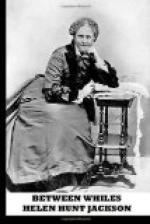It was an odd thing that it never occurred to Jeanne
how near the sill of Victorine’s south window
was to the stout railing of the last broad platform
of the outside staircase. This railing had been
built up high, and was partly roofed over, making a
pretty place for pots of flowers in summer; and Victorine
never looked so well anywhere as she did leaning out
of her window and watering the flowers which stood
there. Many a flirtation went on between this
casement window and the courtyard below, where all
the travellers were in the habit of standing and talking
with the ostlers, and with old Victor himself, who
was not the landlord to leave his ostlers to do as
they liked with horses and grain,—many a
flirtation, but none that meant or did any harm; for
with all her wildness and love of frolic, Mademoiselle
Victorine never lost her head. Deep down in her
heart she had an ambition which she never confessed
even to her aunt Jeanne. She had read enough
romances to believe that it was by no means an impossible
thing that a landlord’s daughter should marry
a gentleman; and to marry a gentleman, if she married
at all, Victorine was fully resolved. She never
tired of questioning her aunt about the details of
her life in Willan Blaycke’s house; and she sometimes
gazed for hours at the gilt-panelled coach, which
on all fine days stood in the courtyard of the Golden
Pear, the wonder of all rustics. On the rare occasions
when her aunt went abroad in this fine vehicle, Victorine
sat by her side in an ecstasy of pride and delight.
It seemed to her that to be the owner of such a coach
as that, to live in a fine house, and have a fine
gentleman for one’s husband must be the very
climax of bliss. She wondered much at her aunt’s
contentment in her present estate.
“How canst thou bear it, Aunt Jeanne?”
she said sometimes. “How canst thou bear
to live as we live here,—to be in the bar-room
with the men, and to sit always in the smoke, after
the fine rooms and the company thou hadst for so long?”
“Bah!” Jeanne would reply. “It’s
little thou knowest of that fine company. I had
like to die of weariness more often than I was gay
in it; and as for fine rooms, I care nothing for them.”
“But thy husband, Aunt Jeanne,” Victorine
once ventured to say,—“surely thou
wert not weary when he was with thee?”
Jeanne’s face darkened. “Keep a civiller
tongue in thy head,” she replied, “than
to be talking to widows of the husbands they have buried.
He was a good man, Willan Blaycke,—a good
man; but I liked him not overmuch, though we lived
not in quarrelling. He went his ways, as men
go, and I let him be.”
Victorine’s curiosity was by no means satisfied.
She asked endless questions of all whom she met who
could tell her anything about her aunt’s husband.
Very much she regretted that she had not been taken
from the convent before this strange, free-hearted,
rollicking gentleman had died. She would have
managed affairs better, she thought, than Aunt Jeanne
had done. Romantic visions of herself as his favorite
flitted through her brain.




